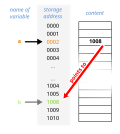Computer programming or coding is the composition of sequences of instructions, called programs, that computers can follow to perform tasks. It involves...
31 KB (3,411 words) - 14:09, 15 November 2024
. A computer program is a sequence or set of instructions in a programming language for a computer to execute. It is one component of software, which also...
127 KB (13,304 words) - 19:17, 20 November 2024
In computer programming, a function (also procedure, method, subroutine, routine, or subprogram) is a callable unit of software logic that has a well-defined...
54 KB (6,633 words) - 05:40, 24 October 2024
The Art of Computer Programming (TAOCP) is a comprehensive monograph written by the computer scientist Donald Knuth presenting programming algorithms...
34 KB (3,792 words) - 03:41, 3 November 2024
A programming language is a system of notation for writing computer programs. Programming languages are described in terms of their syntax (form) and...
65 KB (7,495 words) - 07:32, 22 November 2024
object-oriented programming, a class defines the shared aspects of objects created from the class. The capabilities of a class differ between programming languages...
46 KB (5,216 words) - 05:54, 3 November 2024
In computer programming, a comment is a human-readable explanation or annotation in the source code of a computer program. They are added with the purpose...
55 KB (6,413 words) - 13:57, 19 November 2024
In computer science, conditionals (that is, conditional statements, conditional expressions and conditional constructs) are programming language constructs...
37 KB (3,940 words) - 12:39, 25 October 2024
variables to be among computer science's "most valuable treasures." Donald Knuth, Structured Programming, with go to Statements In computer science, a pointer...
73 KB (9,784 words) - 16:50, 20 November 2024
similarity has been explained by programming language theorists in terms of existential types. In object-oriented programming languages, and other related...
16 KB (1,433 words) - 01:50, 6 October 2024
In computer programming, a parameter or a formal argument is a special kind of variable used in a subroutine to refer to one of the pieces of data provided...
30 KB (3,858 words) - 18:40, 31 October 2024
History of Functional Programming Languages" (PDF). International Symposium on Trends in Functional Programming. Lecture Notes in Computer Science. Vol. 7829...
50 KB (6,372 words) - 19:23, 17 September 2024
In computer programming, a callback is a function that is stored as data (a reference) and designed to be called by another function – often back to the...
17 KB (1,868 words) - 14:58, 14 September 2024
A method in object-oriented programming (OOP) is a procedure associated with an object, and generally also a message. An object consists of state data...
15 KB (1,837 words) - 18:00, 19 May 2024
In computer science, a literal is a textual representation (notation) of a value as it is written in source code. Almost all programming languages have...
4 KB (388 words) - 02:58, 24 July 2024
Skeleton programming is a style of computer programming based on simple high-level program structures and so called dummy code. Program skeletons resemble...
19 KB (2,500 words) - 01:24, 3 November 2024
In some programming languages, const is a type qualifier (a keyword applied to a data type) that indicates that the data is read-only. While this can...
44 KB (5,533 words) - 19:13, 17 July 2024
1960s as part of a structured design, based on characteristics of “good” programming practices that reduced maintenance and modification costs. Structured...
17 KB (1,976 words) - 04:23, 19 November 2024
In computer programming, a constant is a value that is not altered by the program during normal execution. When associated with an identifier, a constant...
20 KB (2,685 words) - 02:31, 24 September 2024
Asynchrony, in computer programming, refers to the occurrence of events independent of the main program flow and ways to deal with such events. These may...
3 KB (356 words) - 10:34, 15 April 2024
In computer programming, a trait is a language concept that represents a set of methods that can be used to extend the functionality of a class. In object-oriented...
22 KB (2,055 words) - 09:26, 24 June 2024
teaches fundamental principles of computer programming, including recursion, abstraction, modularity, and programming language design and implementation...
9 KB (673 words) - 11:43, 7 September 2024
Program analysis tools are extremely important for understanding program behavior. Computer architects need such tools to evaluate how well programs will...
20 KB (2,250 words) - 02:43, 7 September 2024
In computer programming, rank with no further specifications is usually a synonym for (or refers to) "number of dimensions"; thus, a two-dimensional array...
2 KB (335 words) - 18:25, 11 May 2020
In computer programming, a poltergeist (or gypsy wagon) is a short-lived, typically stateless object used to perform initialization or to invoke methods...
3 KB (317 words) - 15:23, 24 October 2024
Installation (or setup) of a computer program (including device drivers and plugins), is the act of making the program ready for execution. Installation...
22 KB (2,683 words) - 00:00, 18 November 2024
this, self, and Me are keywords used in some computer programming languages to refer to the object, class, or other entity which the currently running...
24 KB (3,119 words) - 17:19, 5 September 2024
In computer programming, a declaration is a language construct specifying identifier properties: it declares a word's (identifier's) meaning. Declarations...
8 KB (997 words) - 05:00, 27 August 2024
Programmer (redirect from Computer programmer)
A programmer, computer programmer or coder is an author of computer source code – someone with skill in computer programming. The professional titles software...
27 KB (2,477 words) - 20:38, 13 November 2024
In computer programming, an aspect of a program is a feature linked to many other parts of the program, but is not related to the program's primary function...
2 KB (265 words) - 14:03, 30 June 2024









